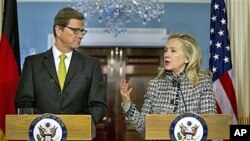The United States and Germany say Iran will face tougher international sanctions on oil revenues if it does not abandon its pursuit of nuclear weapons.
With the European Union moving closer to a vote on an embargo of Iranian oil Monday, German Foreign Minister Guido Westerwelle said the international community must not allow Iran to develop nuclear weapons.
“The government in Tehran keeps violating its international obligations on the transparency of its nuclear program. We have no choice but to pass tough new sanctions that address the financial sources of the nuclear program. One thing is clear: the door for serious dialogue remains open, but the option of nuclear weapons in Iran is not acceptable,” said Westerwelle.
The German foreign minister spoke following talks with U.S. Secretary of State Hillary Clinton, who said the United States and Germany are closely coordinating sanctions meant to deprive Iran of oil revenue it could use to pursue nuclear weapons. Westerwelle said the ultimate goal is clear: preventing a nuclear-armed Iran.
“This is not only our raison d'etre to protect Israel. It is also a question of the balance in the region. And it is also unacceptable if we look to the situation at the nonproliferation necessity worldwide,” said Westerwelle.
Secretary Clinton said the pursuit of nuclear weapons, and what she calls Iran's “needless provocations” against shipping through the Strait of Hormuz, put it on a dangerous path.
“Iran does have a choice to make. It can come back to the table - as we have consistently made clear to them - and address the nuclear program concerns that the international community rightly has or face increasing pressure and isolation,” said Clinton.
The European Union is expected to implement its oil embargo gradually so that already fragile economies - including Greece and Italy - can find other sources of fuel. While Iran will likely find other buyers, industry analysts expect China and India will insist on a discount. That would cut into oil receipts and could further weaken the value of Iran's currency.
Secretary Clinton and Foreign Minister Westerwelle say they are not seeking a conflict with Iran. Instead they want the government in Tehran to return to talks over its nuclear program. But only talks that, in the German foreign minister's words are “serious and substantial” not talks that are meant for show.
US, Germany Say Iran Faces Tougher Sanctions Over Nuclear Program




